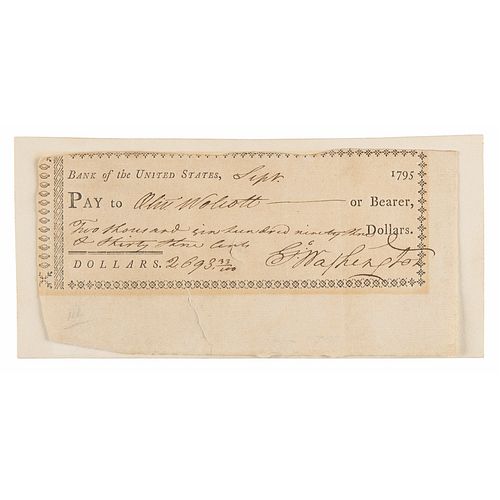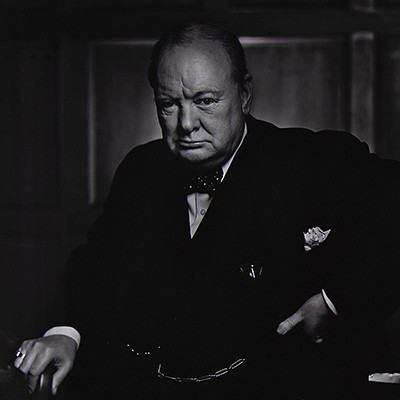George Washington Excessively Rare Check Signed as President, Filled Out by Treasury Secretary Oliver Wolcott Jr. - PSA MINT 10
Two ways to bid:
- Leave a max absentee bid and the platform will bid on your behalf up to your maximum bid during the live auction.
- Bid live during the auction and your bids will be submitted real-time to the auctioneer.
Bid Increments
| Price | Bid Increment |
|---|---|
| $0 | $5 |
| $50 | $10 |
| $200 | $25 |
| $500 | $50 |
About Auction
Feb 22, 2024
RR Auction's first-ever February installment of its Remarkable Rarities series brings some 50+ pieces of history to the auction block, representing the most elusive and extraordinary items offered all year. RR Auction support@rrauction.com
- Lot Description
Excessively rare Bank of the United States check, 6.25 x 3, filled out in the hand of Treasury Secretary Oliver Wolcott Jr. and boldly signed by President George Washington, "Go: Washington," payable to "Oliv. Wolcott" for $2693.33, September 1795. Affixed by its top edge to a thin board and in fine condition, with a block of toning over the check area, and a tear to the lower blank margin, not affecting the check itself; Washington's signature is crisp and bold. Accompanied by a full letter of authenticity and grading from PSA/DNA, evaluating both autographs as MINT 10 examples.
This check pertains to a land transaction made between President George Washington and Colonel Israel Shreve, a veteran of the Revolutionary War who fought alongside Washington at the Battle of Brandywine and Battle of Germantown, and wintered at Valley Forge. A surveyor by trade, Washington had acquired vast land holdings through inheritance and purchase—in addition to large properties in his native Virginia, he owned about 58,000 acres of western lands in Pennsylvania and what is now West Virginia. His first purchase west of the Allegheny Mountains was a 1,644-acre tract of land, called Washington’s Bottom, on the Youghiogheny River in western Pennsylvania.
In the fall of 1789, Col. Shreve leased a 600-acre section of the Washington's Bottom property for a term of five years. When the lease was up, Shreve approached Washington about purchasing that tract, offering 'any Sum per acre your Excellency may please to fix not Exceeding Six Dollars.' Washington replied by offering him the entire tract for £4,000 Pennsylvania currency, one-fourth to be paid upfront and the remainder payable in five yearly installments, every June 1st, at an interest rate of six-percent. In this transaction, Washington acted through his agent, James Ross.
The sum of this check represents Shreve's first payment for the property, made several weeks late. Substantial correspondence on the topic is recorded in The Papers of George Washington, which notes: "On 15 Aug., GW recorded a check on the Bank of Pennsylvania from Israel Shreve to Ross for $2,693.33 and 'by the latter transmitted to me—It being the first payment with interest thereon from the 1st of June until the 1st of Augt for the land I sold the said Shreve in Fayette County.' GW noted that he had given the money to Secretary of the Treasury Oliver Wolcott, Jr., 'to be transferred for my use to the Bank of the U. States.'"
Shreve continued to struggle to pay his debt on time, falling delinquent in spite of Washington's repeated requests and warnings. Although he threatened to foreclose, Washington could not bring himself to sue a fellow Continental Army officer. The History of Fayette Country (1882) reports: "At one time, not long before the death of Washington and Shreve, the former, notwithstanding his great wealth, having become somewhat straitened for money, pressed Shreve hard for payment on the lands, and caused an execution to be issued against him, at the same time writing him a severe letter in reference to his delinquency; but at its close he relented, and said to his old comrade of Trenton and Monmouth, 'not withstanding what has been done, and in consideration of our ancient friendship I give you further indulgence. Take this letter to Col. Thomas Collins, sheriff of Fayette County, and it will operate as a stay of execution.' Col. Shreve took the letter to the sheriff as directed; further time was given, the payments were met (though with great difficulty) by Shreve, but both he and his great creditor passed from earth, leaving the transaction uncompleted and the lands still unconveyed." Ultimately, Washington's executors conveyed the property to Col. Shreve's heirs in 1802.
This check is of further interest as it relates to the First Bank of the United States, established in 1791 as part of a three-part expansion of federal fiscal and monetary power, along with a federal mint and excise taxes, championed by Alexander Hamilton, first Secretary of the Treasury. Hamilton believed a national bank was necessary to stabilize and improve the nation's credit, and to improve handling of the financial business of the United States government under the newly enacted Constitution. Hamilton's successor was Oliver Wolcott, Jr., a fellow veteran of the American Revolution, and an exponent of Hamilton's Federalist policies. - Shipping Info
-
Bidder is liable for shipping and handling and providing accurate information as to shipping or delivery locations and arranging for such. RR Auction is unable to combine purchases from other auctions or affiliates into one package for shipping purposes. Lots won will be shipped in a commercially reasonable time after payment in good funds for the merchandise and the shipping fees are received or credit extended, except when third-party shipment occurs. Bidder agrees that service and handling charges related to shipping items which are not pre-paid may be charged to a credit card on file with RR Auction. Successful international Bidders shall provide written shipping instructions, including specified Customs declarations, to RR Auction for any lots to be delivered outside of the United States. NOTE: Declaration value shall be the item’(s) hammer price and RR Auction shall use the correct harmonized code for the lot. Domestic Bidders on lots designated for third-party shipment must designate the common carrier, accept risk of loss, and prepay shipping costs.
-
- Buyer's Premium



 EUR
EUR CAD
CAD AUD
AUD GBP
GBP MXN
MXN HKD
HKD CNY
CNY MYR
MYR SEK
SEK SGD
SGD CHF
CHF THB
THB




